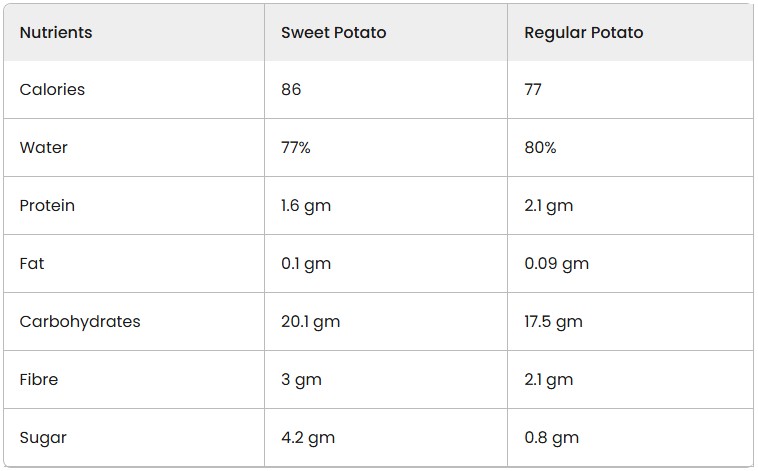Sweet potatoes are a favorite food for many people and are often eaten for breakfast. But is eating sweet potatoes in the morning actually beneficial?

Sweet Potato Nutrition Facts
Sweet potatoes are sweet and starchy, which makes them very filling as a food. Sweet potatoes are known as a superfood because of the amount of nutrients they contain. The table below presents the nutritional value of sweet potato per 100 gms and a comparison of sweet potato vs regular potato.

Benefits of regularly eating sweet potatoes for breakfast
Eating sweet potatoes for breakfast is a great choice as they are low in calories, help you feel full for longer, and support digestion, making them especially good for those suffering from constipation. You can pair sweet potatoes with yogurt, whole milk, salad, or leafy greens to ensure a balanced and nutritious meal.
Additionally, when choosing between sweet potatoes and rice, most people prefer sweet potatoes due to their naturally sweet taste. Eating sweet foods in the morning can improve mood and promote a positive mental state.
Below are some key benefits of regularly eating sweet potatoes for breakfast.

Relieves Constipation
Modern unhealthy diets and lifestyles often lead to nutritional imbalances. This is particularly common among office workers who sit for long hours, have little time to prepare breakfast, and frequently rely on takeout food, leading to constipation among many young individuals.
As one of the most popular whole grains, sweet potatoes are rich in water-soluble fiber, which effectively increases the feeling of fullness, reduces the intake of high-calorie foods, and adds bulk to waste. Sweet potatoes also support bowel movements and help eliminate harmful substances from the body.
Moreover, pectin in sweet potatoes stimulates digestive enzyme secretion, helping to alleviate constipation and regulate gut bacteria.
Rich Source of Vitamin C
Sweet potatoes provide an abundant source of vitamin C, which promotes collagen production for youthful and elastic skin. Vitamin C is also essential for healthy bones and teeth, supports digestion, and helps reduce stress.
Aids in Weight Loss
With a low starch content and no fat, sweet potatoes help prevent the conversion of food into stored fat. Additionally, they keep you full longer, delaying hunger and reducing overall calorie intake, making them an excellent choice for those looking to lose weight.
Although sweet potatoes contain essential nutrients, they should not be overconsumed or used as a complete meal replacement, as this may lead to negative health effects.
According to nutrition experts, consuming 1-2 sweet potatoes for breakfast is ideal. It is also important to include other foods like meat, fish, and vegetables to ensure balanced nutrition.
Cleanses Blood Vessels and Lowers Blood Fat
As we age, blood vessels naturally thicken and harden. Eating sweet potatoes regularly can promote lipid metabolism due to their fiber content. Additionally, the carotene, folic acid, and vitamins in sweet potatoes help improve blood circulation, boost metabolism, and lower blood fat levels.
Boosts Immunity
As a highly nutritious whole grain, sweet potatoes contain various vitamins, minerals, and trace elements that enhance overall health, strengthen the immune system, and help the body fight diseases.
Reduces Eye Strain
For individuals who work with computers for extended periods, prolonged exposure to screen radiation can cause dry and fatigued eyes.
Carotene, vitamin A, and other nutrients in sweet potatoes support retinal health, nourish the optic nerve, and help reduce eye dryness and fatigue. Regular consumption of sweet potatoes can contribute to better eye health over time.
Protects the Stomach
Unhealthy eating and lifestyle habits can lead to stomach pain and digestive issues. Once stomach problems arise, digestion, nutrient absorption, and the body’s detoxification processes are affected, negatively impacting overall health.
Since sweet potatoes are rich in fiber, regular consumption can accelerate digestive processes, promote the elimination of harmful substances from the lungs and stomach, reduce digestive discomfort, and ease the burden on the stomach.

Who Should Avoid Sweet Potatoes?
Sweet potatoes offer many health benefits, but they should be consumed in moderation and avoided in certain cases:
People with Kidney Disease
Those with kidney disease should avoid sweet potatoes, as they are high in fiber, potassium, and vitamins. When kidney function is impaired, the body struggles to eliminate excess potassium, which can have harmful effects on the heart.
People Who Are Hungry
Sweet potatoes contain a high amount of sugar, which, when consumed on an empty stomach, can stimulate excessive gastric acid secretion, leading to heartburn, bloating, and stomach discomfort. It is recommended to cook sweet potatoes thoroughly to neutralize certain enzymes before eating them.
People with Stomach Disorders
Eating sweet potatoes on an empty stomach can stimulate acid secretion, which may lead to stomach pain and ulcers. For individuals with chronic stomach conditions, consuming sweet potatoes when hungry can worsen their symptoms.
Overall, it is permissible to eat sweet potatoes in the morning. However, they should not be the sole dietary staple over a prolonged period. Diversifying one’s diet is essential to maintain a balanced and healthy nutritional intake.
